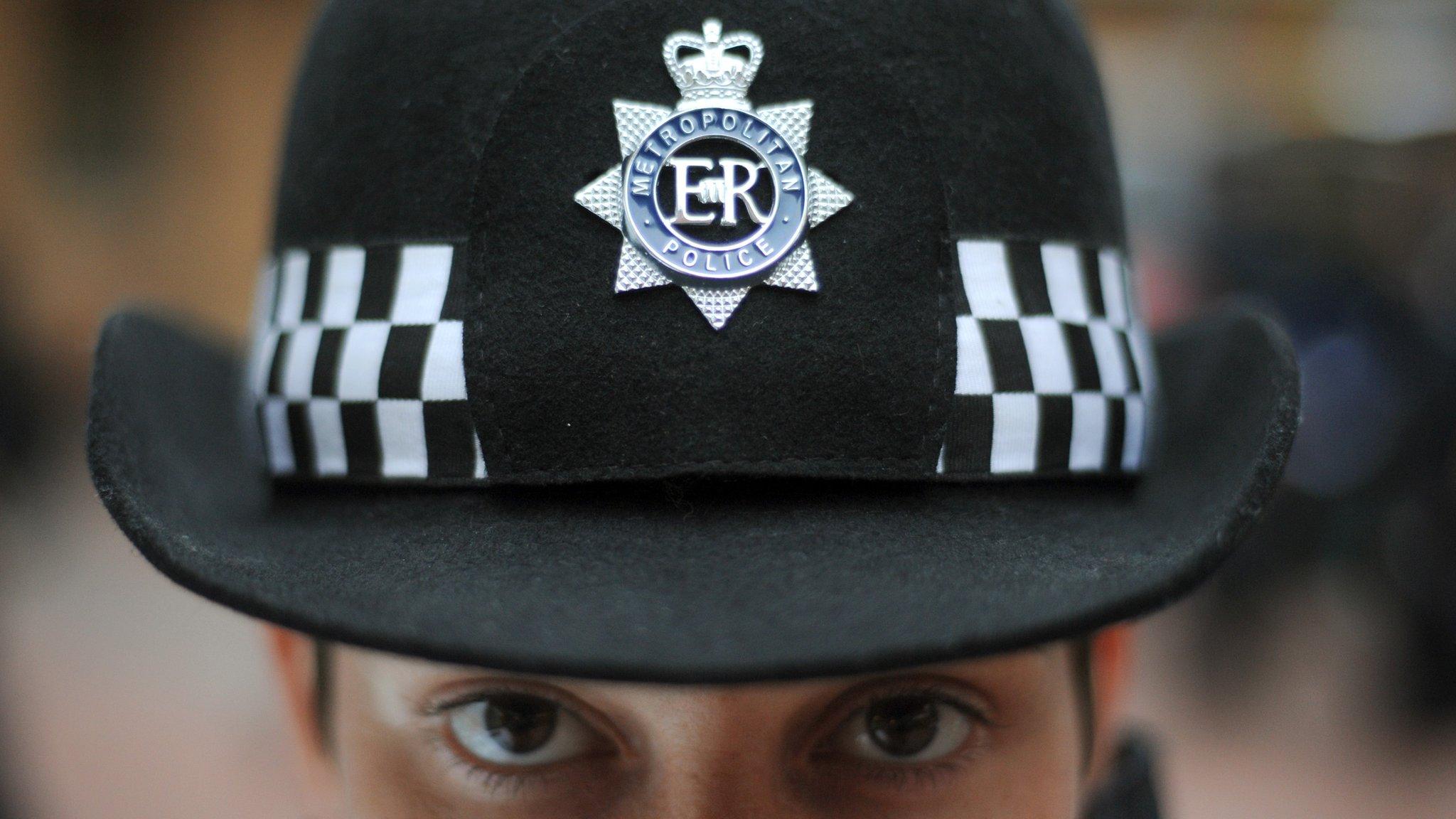Tattoos in the workplace: Your views
- Published
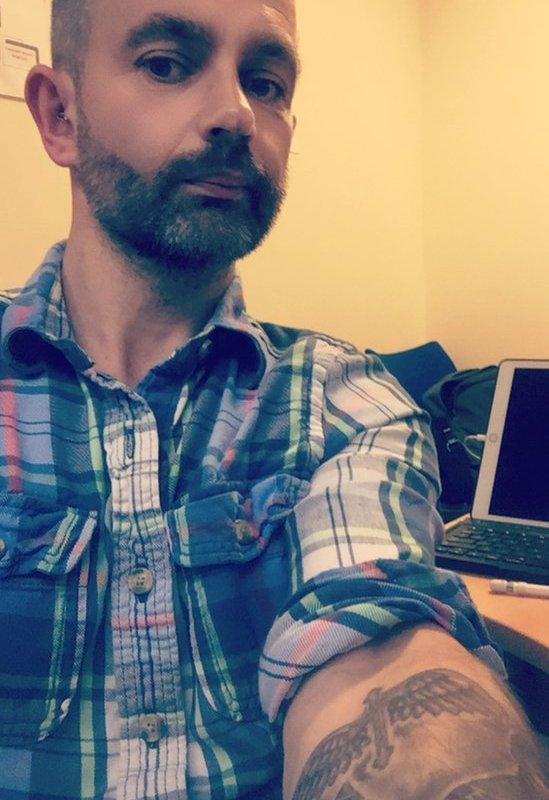
Fashion or faux-pas - should tattoos stay undercover in the workplace? Love them or hate them, everyone has a view about body art, but should this affect your treatment at work?
The workplace advice service Acas has said employers could be missing out on top staff because they are rejecting candidates with tattoos.
Recently, the Police Federation of England and Wales said officers should be allowed to have tattoos on their hands, neck and faces.
Here's a selection of mixed opinions on tattoos at work.

"My tattoo doesn't stop me from saving a person's life."
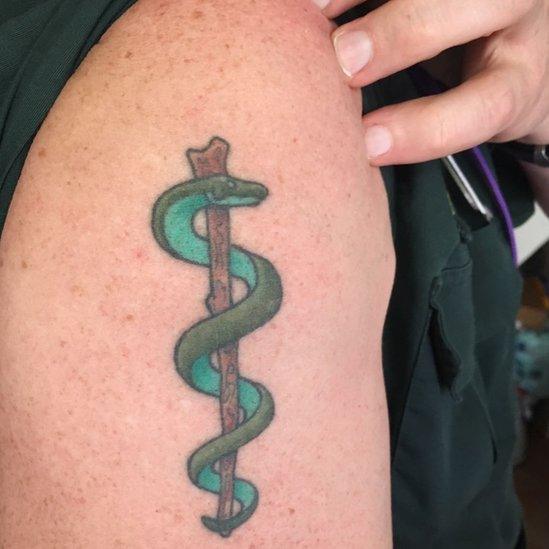
"People are too judgemental regarding how others look these days and it needs to change."
Graham North, a paramedic in Slough, has a tattoo on his upper arm that is not always visible:
"I don't see many nurses or doctors with visible tattoos but again it doesn't hinder their work either.
"Some have long tattoo sleeves but as long as they're not offensive I don't think it should be an issue. My tattoo doesn't stop me from saving a person's life. I even talk to patients about mine.
"Tattoos are a part of modern society and employers should get over themselves."

"My forearm tattoo was airbrushed out of a promotional photo."
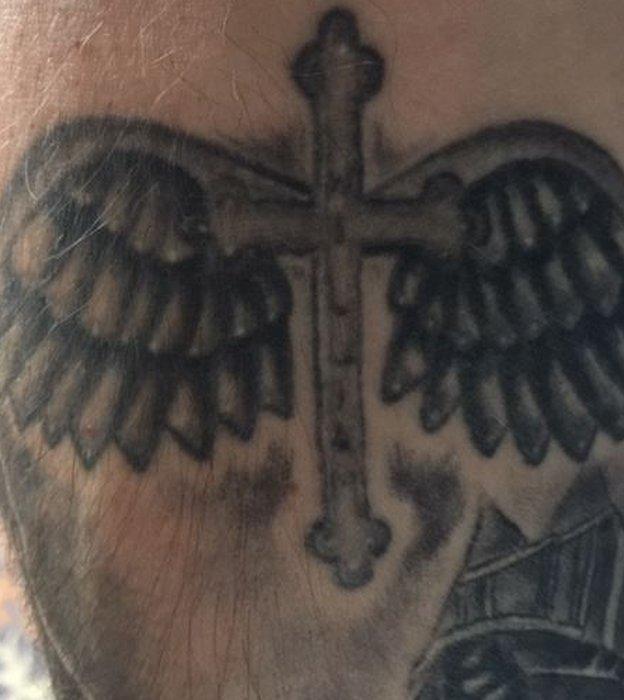
"This is a personal memory of my father"
Colin McAllister-Gibson works in Manchester as a learning technologist and has a sentimental tattoo:
"I was wearing a T-shirt when my old employer took a promotional photo. I later noticed that my forearm tattoo had been airbrushed out.
"They told me it was inappropriate for the college where I was a manager and lecturer. The tattoo is very personal as it's a memory of my father.
"Thankfully the university I work at now doesn't have an issue with tattoos."

"If a company doesn't want to hire me based on my appearance, that is not a company I want to work for."
Ozzy Armstrong from Reading says having tattoos hasn't held him back.
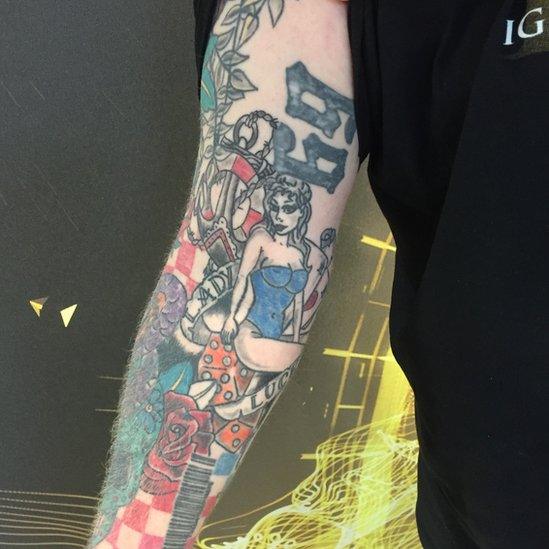
"I'm now working for a company who honestly doesn't care at all what I look like, just how well I can do my job."
"I have two arm sleeves, a leg piece, chest and stomach tattoos.
"My parents said having them would severely hinder my career progression.
"Unfortunately in the past I have gone for interviews and been told that while I had a strong CV and good aptitude for a role, I wasn't going to be allowed to progress as tattoos didn't fit the company culture.
If a company doesn't want to hire me based on my appearance, that is not a company I want to work for."

"Wear them with pride but maintain a professional image when necessary."
A barrister in her twenties (who wishes to remain anonymous) reveals she has several tattoos.
"I have one between my shoulders which extends onto the nape of my neck, so is partially visible unless I wear a collared shirt or suit jacket, and one on my calf which can be clearly seen through thin or flesh coloured tights. They are 'work appropriate'.
"Tattoos are still quite uncommon in my profession, especially among women, but I've never felt held back or judged for them. There is an understanding that at this level of professional life your skills as a lawyer should speak for themselves and your appearance is of little importance.
"It's possible to be at the highest levels of the professional world with tattoos, and to wear them with pride, but that depends not only on having an understanding employer, but also on being able to maintain a professional image when necessary."

"It is a dinosaur era that needs to catch up."
Brent Isaac, a former police officer, has several tattoos:
"They were frowned upon by senior officers and I had to cover up. I always found that when dealing with the majority of hostile individuals they were very often a diffuser for situations as the art work is admired.
"The famous saying 'never judge a book by its cover' springs to mind.
"I love my tattoos as they all have a meaning to me and my family.

"It shows an obvious lack of social morals."
Graham Cutler in Clitheroe, Lancashire, does not like visible tattoos:
"I would actively choose not to deal with someone who has tattoos on their face and down their arms. It is a sign of gross immaturity and is highly offensive to me.
Tattoos and piercings simply don't look nice or acceptable on a woman, in my opinion, as a woman has a natural beauty of her own. They never have been acceptable and never will."
Compiled by Sherie Ryder, BBC's UGC and Social News Team
- Published21 September 2016

- Published29 August 2016
